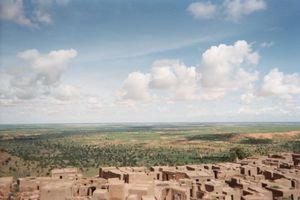Advertisement
Published: March 9th 2008

 Burkina Faso is one flat country
Burkina Faso is one flat country
This is the view from the top of the cliff in Dogon Country in Mali. They told me the endless flat land is Burkina Faso. They also told me that sea carved the cliff thus this used to be an ocean vista. Neato. The plan was to fly through (well go as fast as possible on crowded, uncomfortable long-distance public transit vans, called tro-tros) Burkina Faso, and grab my Ghana visa in the capital (best name EVER), Ouagadougou (pronounced wa-ga-doo-goo). I unfortunately spent an additional 4 days there, in a clinic, with an IV, and tons of little malaria parasites attempting to replicate in my RBCs. It was
plus grave, said Dr. Kofi. That was Burkina Faso.
Fun fact...A famous and loved nationalist leader renamed Upper Volta (the colonial name) Burkina Faso, which means “the land of the honest men”. The cool part is that the name is created from two of the many languages the many ethnic groups speak. BF is almost half and half Muslim and Christian. The joke is that they are 50%!M(MISSING)uslim, 50%!C(MISSING)hristian, and 100%!a(MISSING)nimalist (folk religions). With the exception of the Dogon people in Mali who refused to convert, most of the peoples in the region seemed to have accepted an invading religion while holding strong to older traditions and beliefs.
One manifestation of these traditional beliefs is the practice of scarification. I don't have any pictures but can use descriptive words and imagery - In all the countries I visited in West Africa, especially Burkina Faso and northern Ghana, the practice of scarification was evident. Small scars to VERY intricate designs are cut into the face and other places on the body. Think swirly thin lines on the forhead or cheeks to less precise gashes on shoulders and such. Some people use it as a way to ward off evils or specific medical ailments, while others use it to denote class or clan. The people April lived with in Mauritania (the Pulaars) had a tradition of two small nicks just lateral to each eye. This is to ward of eye illnesses such as night blindness (in fact due to Vitamin A deficiency, which is very common in the area). It was something I've never seen before and Lonely Planet explained I might witness in the area. Thanks for the heads up, LP.
Advertisement
Tot: 0.3s; Tpl: 0.011s; cc: 7; qc: 51; dbt: 0.048s; 1; m:domysql w:travelblog (10.17.0.13); sld: 1;
; mem: 1.1mb

 Burkina Faso is one flat country
Burkina Faso is one flat country